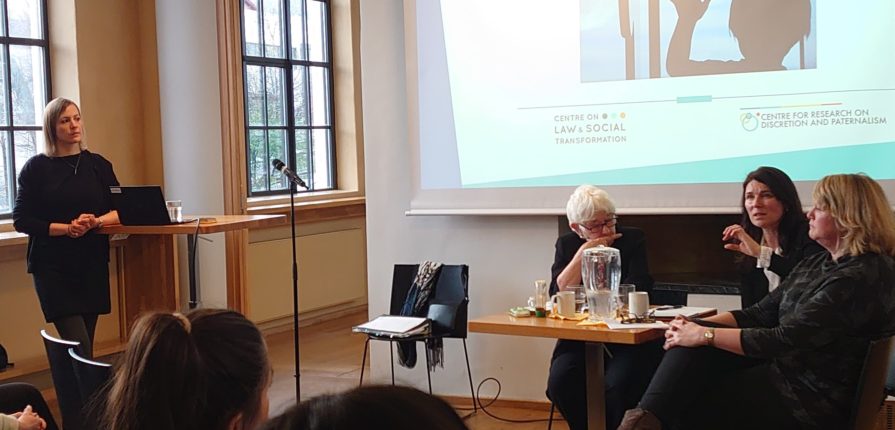PUBLIC EVENT: We can do better in protecting the rights of the child in court, experts claim.
The United Nations Convention on the Rights of the Child (CRC) recently celebrated its 30th anniversary, and although much has been achieved in the last three decades, there is still work to do.
The Centre for Research on Discretion and Paternalism, in cooperation with LawTransform, brought experts from different professional fields together for a public seminar in Bergen to explore the child’s perspective in the courts.
From the parents’ perspective to child’s perspective
The keynote speaker of the event was Nuala Mole, the founder of and a senior lawyer at The AIRE Centre, a non-governmental organization working with international human rights law.

Nuala Mole
Mole focused on the procedural safeguards in applying children’s rights, including representation of the child in proceedings before the European Court of Human Rights (ECtHR). She called for a shift from starting from the parents’ perspective to taking the child’s perspective.
In the recent case of Strand Lobben v Norway, Nuala Mole explained, the mistakes had in her opinion been made at the very beginning of the proceedings, illustrating the importance of ensuring that child and biological parents effectively have an opportunity for contact.
– There is a problem with having biological parents represent the child in these cases, as happened in Strand Lobben. Recently, in A and B v Croatia[1], the ECtHR requested separate representation for the child. This was not a child protection case, however, reveals the need to review the procedural rules in the Strasbourg court to guarantee that the child is properly represented in all cases.
Need for independent representation

Lise Gro Søreide
Lise Gro Søreide, District Court Judge at the Bergen tingrett, provided her professional insight into children’s position within child protection cases in Norway.
– The children and their rights should always be at the centre of these proceedings, with close attention being paid to the corresponding obligations of the state. It is important to find out the child’s best interests, which necessarily entails proper representation of the child.
Marit Skivenes, Director of the Centre for Research on Discretion and Paternalism, pointed out that there are three central issues that should be urgently addressed by the ECtHR.

Marit Skivenes
– First, the question of proper representation of the child in child protection cases needs to be addressed, and second, how the child’s rights are analysed and implemented by the Court. Thirdly, more generally, it is of huge importance to review how the Court and society at large perceive the child.
Towards more child-centric proceedings
The experts discussed the ECtHR’s distinction between child-related matters in public and private law cases. The panel agreed the court should become more aligned by always putting the child first, including proper and independent representation for all children in all cases.
The panel also discussed how to better guarantee the best interests of the child, the need to include the perspective of the child in the proceedings, over the child’s right to be heard. Here, the connection between Articles 3 and 12 of the CRC was stressed, in that protection of the child’s best interests is informed through hearing the child.
The panel remarked how important it is to focus on the particular child, while being sensitive to the child’s age which will affect the extent to which the child herself can contribute to the proceedings.
You might also be interested in:
- Marit Skivenes: “Child protection and child-centrism – the Grand Chamber case of Strand Lobben and others v. Norway 2019”. Blogpost in Strasbourg Observer.
PHOTOS: Ane Myklatun Krosness


